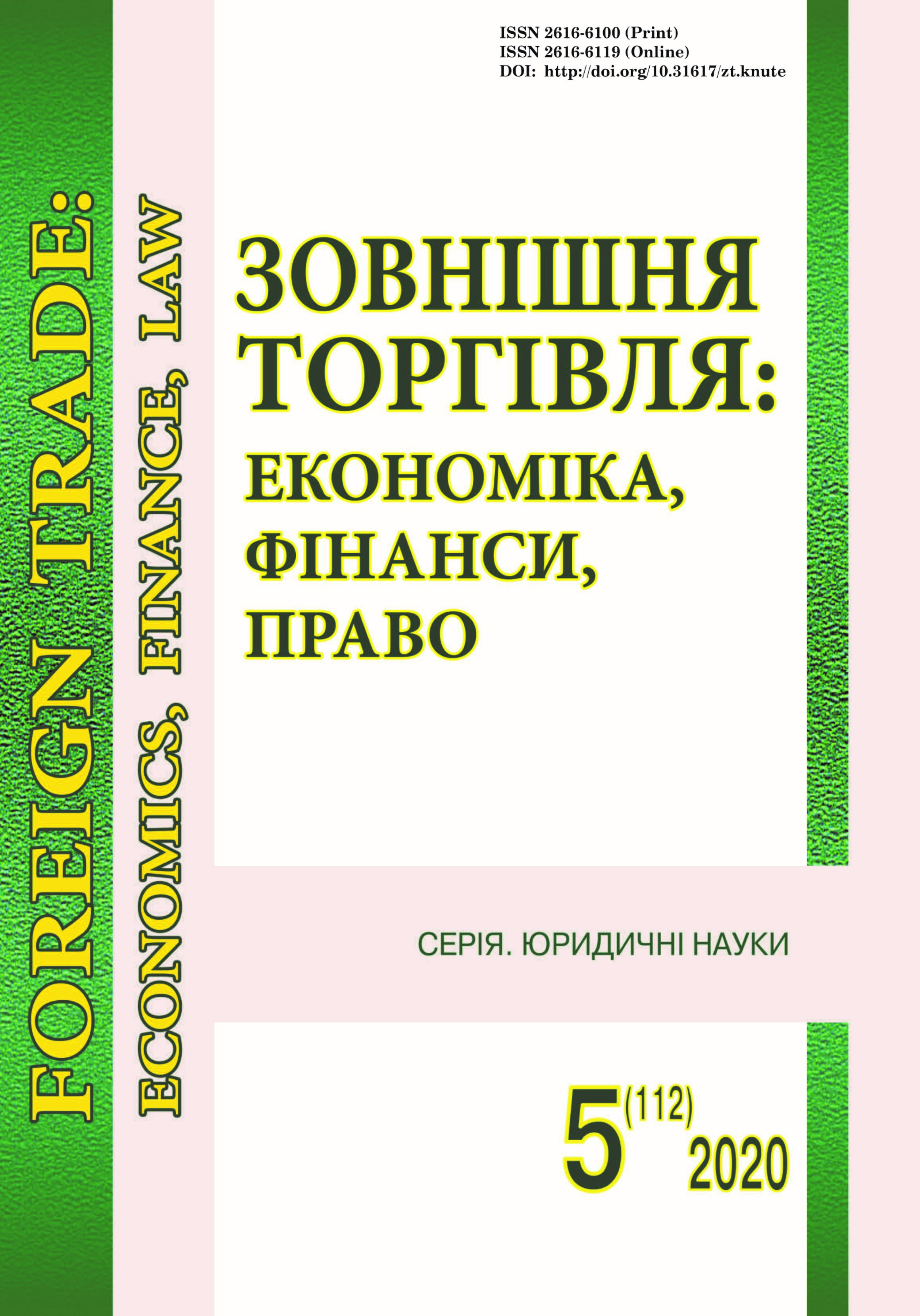Categories of human rights and freedoms in doctrine and legislation
DOI:
https://doi.org/10.31617/zt.knute.2020(112)02Keywords:
human rights, human freedoms, information rights and freedoms, information legislation, information freedom.Abstract
Background. Studies of the internal nature of the categories of «human rights» and «human freedoms» in the context of information law are especially relevant, as information rights and human freedoms are currently being formed. Such research is timely for doctrinal and applied applications.
Analysis of recent research and publications. Although the nature of the categories of «human rights» and «human freedoms» has been clarified in the works of scholars, there is no clear position in jurisprudence on the internal nature of these categories.
The aim of the article is to study the internal nature of the categories of «human rights» and «human freedom», to distinguish between interpretations of such nature by doctrine and the legislator, to identify the impact on understanding the ontology of information rights and human freedoms.
Materials and methods. The theoretical basis of the article are scientific works of scientists, normative – the Constitution of Ukraine and a number of laws of Ukraine, methodological – general scientific and special legal methods of cognition.
Results. Positions are analyzed: a) complete denial of the existence of differences between the categories of «human rights» and «human freedom» (identification); b) differentiation of these categories by different criteria.
Conclusion. The categories of «human rights» and «human freedoms» are different in their internal nature (human rights – proclaimed and limited by the state, have a mechanism for implementation, and human freedoms – are absolute and implemented under favorable social circumstances).
The position of the legislator is the indivisibility of the categories of «human rights» and «human freedom». The term «human freedom» is used mainly in cases related to creativity, intellectual development, self-awareness and worldview.
Common to all human rights and freedoms, the principle of understanding their internal nature by the legislator explains how the following categories are used in consolidating information rights and human freedoms: there is an analogy.
References
Golovatyj, S. (2015). Triada yevropeysʹkykh tsinnostey – verkhovenstvo prava, demokratiya, prava lyudyny – yak osnova ukrayinsʹkoho konstytutsiynoho ladu (chastyna tretya: prava lyudyny) [The Тriad of the European values – rule of law, democracy, human rights – as the Foundation of the Ukrainian constitutional order (part three: human rights)]. Pravo Ukrayiʹny – Law of Ukraine, 1, 13-92 [in Ukrainian].
Zagoruj, I. S. (2016). Ponyattya «prava lyudyny»: teoretyko-pravovi pidkhody do rozuminnya prav lyudyny [The concept of «human rights»: theoretical and legal approaches to understanding human rights]. Visnyk Lugansʹkogo derzhavnogo universytetu vnutrishnix sprav imeni E. O. Didorenka – Bulletin of Luhansk State University of Internal Affairs named after E. Didorenko, 2, 66-82 [in Ukrainian].
Malʹko, A. V. (2018). Ogranicheniya v prave: problemy teorii, praktiki, politiki [Restrictions in law: problems of theory, practice, politics]. Yuridicheskaya tekhnika – Legal technique, 12, 238-248) [in Russian].
Danylʹyan, O. G. &Dzʹobanʹ, O. P. (2017). Dialektychna yednistʹ informatsiynykh prav ta informatsiynoyi svobody: do usvidomlennya problemy [Dialectical unity of information rights and information freedom: to the realization of the problem]. Visnyk Natsionalʹnoho universytetu «Yurydychna akademiya imeni Yaroslava Mudroho» – The Bulletin of Yaroslav Mudryi National Law University, 1 (32), 5-13 [in Ukrainian]. https://doi.org/10.21564/2075-7190.32.101663
Seleznʹova, O. M. (2019). Informatsiyni prava: teoretychni ta systemni polozhennya [Information rights: theoretical and systemic provisions]. Informaciya i pravo – Information and law, 3 (30), 9-15 [in Ukrainian]. https://doi.org/10.37750/2616-6798.2019.3(30).194774
Seleznʹova, O. M. (2019). Osnovni istorychni etapy stanovlennya v Ukrayini zakonodavstva pro informatsiyni prava [The main historical stages of formation of the legislation on information rights in Ukraine]. Aktualʹni pytannya humanitarnykh nauk – humanities science current issues, (Vol. 26), (Iss. 2), (рр. 4-7) [in Ukrainian].
Troyan, V. A. (2017). Prava i svobody lyudyny ta interesy derzhavy yak obʹyekt publichno-servisnoyi diyalʹnosti Natsionalʹnoyi politsiyi Ukrayiny [Human rights and freedoms as well as state interests as objects of public and service activities of the National Police of Ukraine]. Visnyk Kryminolohichnoyi asotsiatsiyi Ukrayiny – The Bulletin of Criminological Association of Ukraine, 1 (15), 229-239 [in Ukrainian].
Bryzhko, V. M. (2009). Metodolohichni ta pravovi zasady uporyadkuvannya informatsiynykh vidnosyn [Methodological and legal bases of ordering information relations]. Kyiv: PanTot [in Ukrainian].
Skakun, O. F. (2011). Teoriya derzhavy i prava [Theory of state and law]. Тextbook. Kyiv: Alerta; CzUL [in Ukrainian].
Donchenko, O. P. (2010). Svoboda yak kategoriya prava [Freedom as a category of law]. Candidate’s thesis, Odesa [in Ukrainian].
Komarov, S. A. (1998). Obshchaya teoriya gosudarstva i prava [General theory of state and law]. textbook. Moskva: Yurayt [in Russian].
Razmyetayeva, Yu. S. (2013). Prava lyudyny yak fundamentalʹna tsinnistʹ hromadyansʹkoho suspilʹstva [Human rights as a fundamental value of civil society]. Xarkiv: Fynart [in Ukrainian].
Rudych, F. M., & Balaban, R. V. (et all). (2008). Politychna systema ta instytuty hromadyansʹkoho suspilʹstva v suchasniy Ukrayini navch [The political system and institutions of civil society in modern Ukraine]. textbook. Kyiv: Lybidʹ [in Ukrainian].
Kolodij, A. M.; & Olijnyk, A. Yu. (2008). Prava, svobody ta obov'yazky lyudyny i hromadyanyna v Ukrayiʹni [Rights, freedoms and responsibilities of man and citizen in Ukraine]. Тextbook. Kyiv: Pravova yednist` [in Ukrainian].
Additional Files
Published
How to Cite
Issue
Section
License
Copyright (c) 2022 Foreign trade: Economics, Finance, Law

This work is licensed under a Creative Commons Attribution 4.0 International License.
This work is licensed under a Creative Commons Attribution 4.0 International (CC BY 4.0)







